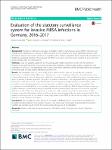Evaluation of the statutory surveillance system for invasive MRSA infections in Germany, 2016–2017
Schönfeld, Viktoria
Diercke, Michaela
Gilsdorf, Andreas
Eckmanns, Tim
Walter, Jan
Background: Mandatory notification of invasive methicillin-resistant Staphylococcus aureus (MRSA) infections was introduced for laboratories in Germany in 2009. The aims were to support local health authorities (LHAs) in their mandate to prevent and control infections in hospitals and to improve population-based nationwide surveillance of healthcare associated infections. We evaluated the MRSA surveillance system to assess whether its aims were met and to identify areas for improvement.
Methods:Using the updated guidelines for evaluating public health surveillance systems by the Centers for Disease Control and Prevention we assessed the attributes simplicity, timeliness, data quality, acceptability, and usefulness. In 2016/2017 we interviewed staff in LHAs, state health authorities (SHAs), and laboratories and analyzed surveillance data of cases notified between 2009 and 2016.
Results:We interviewed 10% of LHAs (n = 38), 63% of SHAs (n = 10), 5 selected laboratories and analyzed information on 27,706 notified MRSA cases. LHAs reported that on receiving notifications from laboratories they contacted hospitals for clinical information, which was time-consuming and complicated as physicians were hard to reach or refused to answer questions, citing doctor-patient confidentiality. LHAs suggested reducing the amount of information collected as some clinical information was unnecessary for implementing control measures. LHAs stated that they received notifications on time, however surveillance data analysis showed some delay. Data completeness exceeded 90% for most variables, however it was only 68% and 80% for dates of disease onset and hospital admission respectively making it impossible to discriminate between hospital and community acquired infections in half of the cases. The surveillance system was well accepted by half of the interviewees. A third however stated that the benefits of the surveillance system were outweighed by the work associated with it. The majority rated the system to be useful for recognizing trends in the MRSA incidence and the ability to check up on infection control measures in hospitals.
Conclusions:The surveillance system proved to be useful by fulfilling its aims. It was timely, acceptable and provided complete data for most variables. However, the system was complicated; ensuring that only relevant variables are reported could simplify the system without losing any of its usefulness.
Dateien zu dieser Publikation

